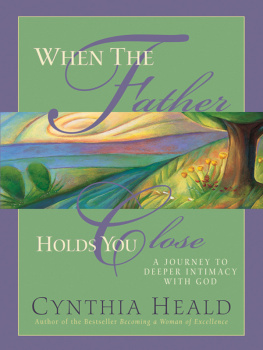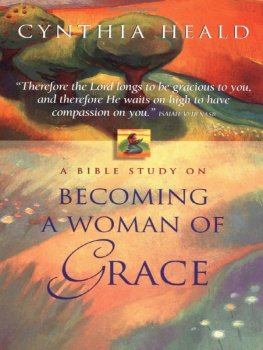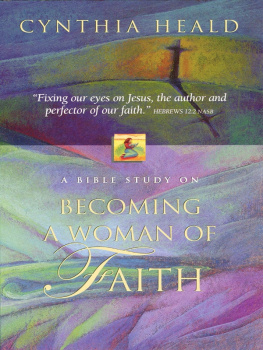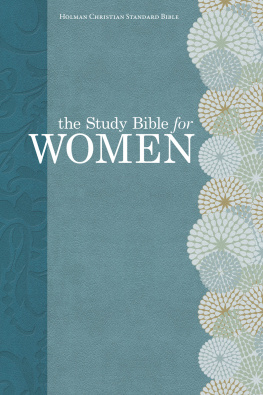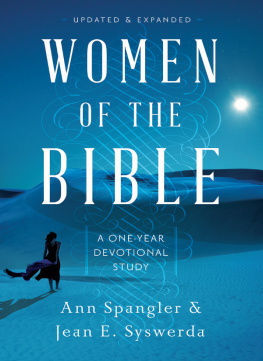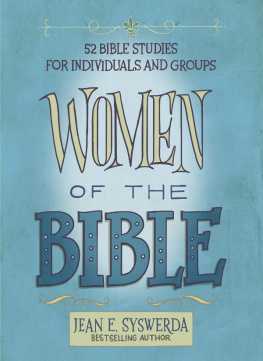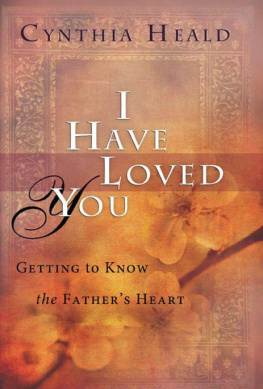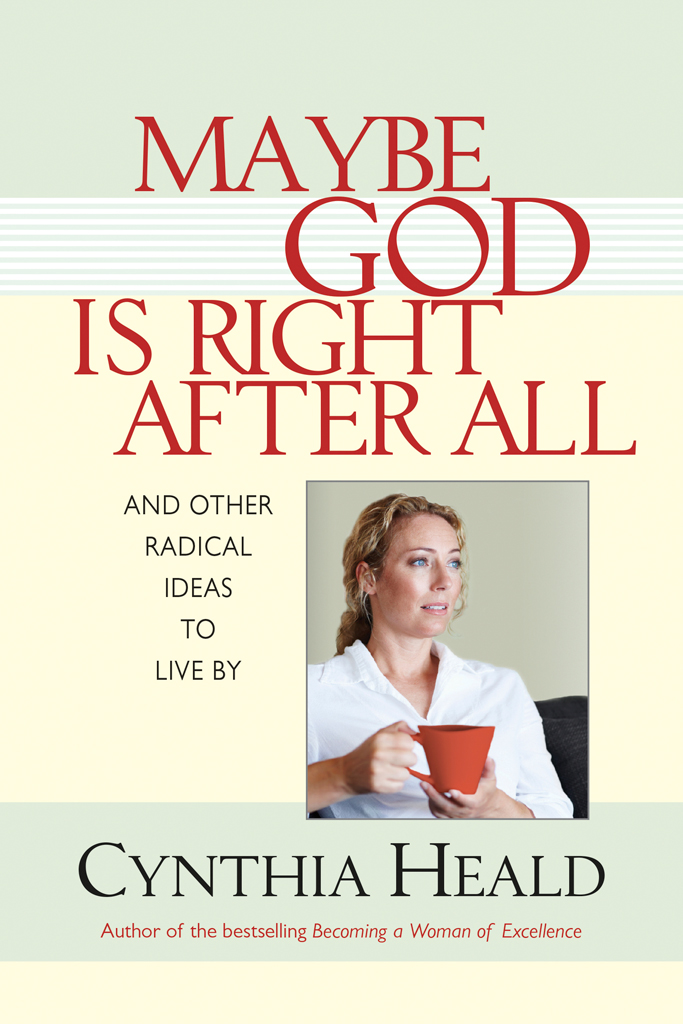Visit Tyndale online at www.tyndale.com.
TYNDALE and Tyndales quill logo are registered trademarks of Tyndale House Publishers, Inc.
Maybe God Is Right After All
Copyright 2005 by Cynthia Heald. All rights reserved.
Cover photograph of woman copyright by Daniel Laflor/iStockphoto. All rights reserved.
Designed by Beth Sparkman
Edited by Lynn Vanderzalm
Some of the names in this book have been changed to protect the privacy of the people who shared their stories.
Unless otherwise indicated, all Scripture quotations are taken from the Holy Bible, New Living Translation, second edition, copyright 1996, 2004, 2007 by Tyndale House Foundation. Used by permission of Tyndale House Publishers, Inc., Carol Stream, Illinois 60188. All rights reserved.
Scripture quotations marked NLT-1 are taken from the Holy Bible, New Living Translation, first edition, copyright 1996 by Tyndale House Foundation. Used by permission of Tyndale House Publishers, Inc., Carol Stream, Illinois 60188. All rights reserved.
Scripture quotations marked The Message are taken from The Message by Eugene H. Peterson, copyright 1993, 1994, 1995, 1996, 2000, 2001, 2002. Used by permission of NavPress Publishing Group. All rights reserved.
Scripture quotations marked NKJV are taken from the New King James Version. Copyright 1982 by Thomas Nelson, Inc. Used by permission. All rights reserved.
Scripture verses marked Phillips are taken from The New Testament in Modern English by J. B. Phillips, copyright J. B. Phillips, 1958, 1959, 1960, 1972. All rights reserved.
Scripture quotations marked NASB are taken from the New American Standard Bible, copyright 1960, 1962, 1963, 1968, 1971, 1972, 1973, 1975, 1977, 1995 by The Lockman Foundation. Used by permission.
Library of Congress Cataloging-in-Publication Data
Heald, Cynthia.
Maybe God is right after all / Cynthia Heald.
p. cm.
ISBN 978-1-4143-0084-9 (sc)
1. Christian women Religious life. 2. Heald, Cynthia. I. Title.
BV4527.H398 2005
248.843 dc22 2005017289
Build: 2015-12-17 15:02:41
I gratefully dedicate this book to my mentor, Mary Tabb, who lovingly and patiently prepared me to walk the narrow way and to live my life securely in the knowledge that God is always right.

Ten Truths for Living Gods Life
1. Maybe God Is Right After All
2. God Is for You, Not against You
3. Trust God, Even When It Doesnt Make Sense
4. Freedom from Self Is a Choice
5. Keep Your Hand in His
6. Gods Word Is All the Truth Youll Ever Need
7. You Will Never Regret Doing What Is Right
8. Love Is Not Optional
9. Forgiveness Frees the Forgiver
10. Its Gods Life
Cynthia Heald
Authors Note
Thank you for wanting to read this book. I am honored to be a small part of your life as you read about the truths that continue to transform my life.
You can use this book in several ways. As I have written it, I have pictured myself sitting across the table from you and sharing my heart as we have a cup of tea. I have tried to anticipate your questions and needs. Enjoy the book as a kind of conversation between the two of us.
You can also use the book in a group Bible study or book club. After each chapter, you will find reflection questions and Bible verses that can help stimulate discussion about what you have read.
I pray that however you read and study this book, you will be encouraged in a fresh way to live radically for the Kingdom of God. Blessings as you take hold of his hand and walk his true and right paths.
Introduction: My Search for Radical Ideas
Two roads diverged in a wood, and I
I took the one less traveled by,
And that has made all the difference.
Robert Frost

There comes a moment when people who have been dabbling in religion (mans search for God) suddenly draw back. Supposing we really found Him? We never meant it to come to that! Worse still, supposing He had found us? C. S. Lewis
I t was September 1959, and I was a twenty-year-old senior on a university campus. Three of my friends and I were moving into a large off-campus house that had been remodeled for a semi-communal living project. The directors of this venture had a vision for teaching qualified students to think philosophically, to be exposed to the basic tenets of world religions, and to learn about how to live together in a true community.
I joined this unique opportunity because it offered an atmosphere of intellectual exploration of truth with others who were committed to the same goals. This was a radical concept for our university campus, but I was looking for radical. My teen years were spent in the conservative 1950s, but in college I began to read and listen to the voices that called for new, revolutionary ideas. This community seemed to provide a perfect, safe place to examine truth and learn how to make a difference in the world. I was in the right place at the right time. The psychedelic sixties were in the making and ready to explode with a radical, countercultural movement that would have an impact on our country for decades. It was the time of flower children, rock music, and LSD.
Each week the members of our community attended two night classes for which we were given extensive reading assignments. We read Jean-Paul Sartre, Charles Darwin, Sren Kierkegaard, and Rudolf Bultmann. We explored a wide spectrum of viewpoints about the significance of life and how we should live in a world of uncertainty.
Part of our regimen was to eat evening meals together and then launch into lively discussions about current issues and world problems, from the cold war with Russia to the coming free-love revolution. One of the members of our group was in a continual state of distress because he believed that an atomic war with Russia was imminent. Our group was passionate about race relations, and our fervor led us to insist on a meeting with the president of our university. He graciously invited a few of us to lunch and listened to our pleas for racial integration on our campus and in our country. Our group fiercely debated questions about how religion should affect our lives, what the purpose of life is, and our right to challenge the status quo.
Little did I know that we, along with countless other students, were planting the seeds for the coming civil rights movement and the Vietnam War protests. We were the forerunners and future leaders of Students for a Democratic Society (SDS) on our campus. This community was in every way a radical challenge to the establishment, and I felt that I was on the cutting edge of our culture, poised to change the world.
As an individual within this community, I was personally searching for foundational truth to live by. I wanted truth that would anchor my life and give it meaning truth that would enable me to really live, not just exist. I wanted my life to count; I wanted to make a contribution to the world. I didnt want just to blend in with everyone else and settle into a mundane routine for the rest of my life. I was searching for spiritual truths that would give my life purpose and passion. I wanted to take the road less traveled. I wanted to live wholeheartedly, to live radically.


